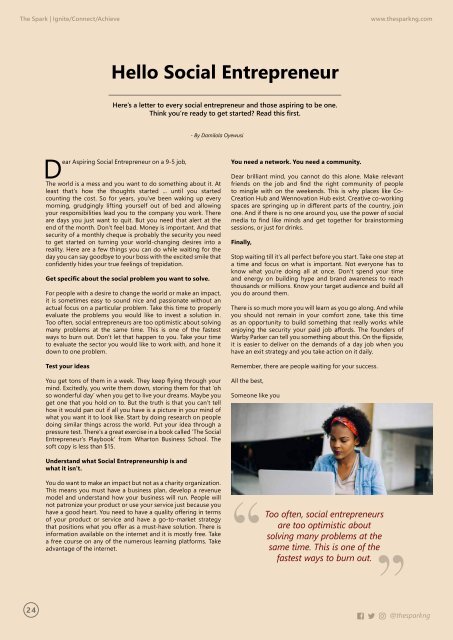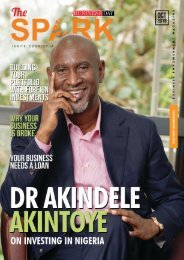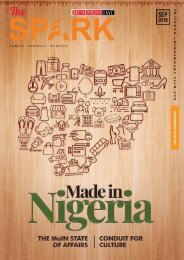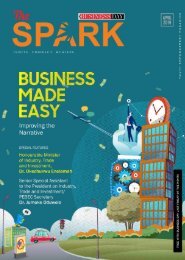The Spark Magazine (May 2018)
Create successful ePaper yourself
Turn your PDF publications into a flip-book with our unique Google optimized e-Paper software.
<strong>The</strong> <strong>Spark</strong> | Ignite/Connect/Achieve www.thesparkng.com www.thesparkng.com <strong>The</strong> <strong>Spark</strong> | Ignite/Connect/Achieve<br />
Hello Social Entrepreneur<br />
Here’s a letter to every social entrepreneur and those aspiring to be one.<br />
Think you’re ready to get started? Read this first.<br />
- By Damilola Oyewusi<br />
5 Opportunities for<br />
Social Entrepreneurs<br />
Sometimes, what we see as problems are simply<br />
opportunities that we can harness to move our country<br />
forward and make some money while at it.<br />
By Ayandola Ayanleke<br />
Dear Aspiring Social Entrepreneur on a 9-5 job,<br />
<strong>The</strong> world is a mess and you want to do something about it. At<br />
least that’s how the thoughts started ... until you started<br />
counting the cost. So for years, you’ve been waking up every<br />
morning, grudgingly lifting yourself out of bed and allowing<br />
your responsibilities lead you to the company you work. <strong>The</strong>re<br />
are days you just want to quit. But you need that alert at the<br />
end of the month. Don’t feel bad. Money is important. And that<br />
security of a monthly cheque is probably the security you need<br />
to get started on turning your world-changing desires into a<br />
reality. Here are a few things you can do while waiting for the<br />
day you can say goodbye to your boss with the excited smile that<br />
confidently hides your true feelings of trepidation.<br />
Get specific about the social problem you want to solve.<br />
For people with a desire to change the world or make an impact,<br />
it is sometimes easy to sound nice and passionate without an<br />
actual focus on a particular problem. Take this time to properly<br />
evaluate the problems you would like to invest a solution in.<br />
Too often, social entrepreneurs are too optimistic about solving<br />
many problems at the same time. This is one of the fastest<br />
ways to burn out. Don’t let that happen to you. Take your time<br />
to evaluate the sector you would like to work with, and hone it<br />
down to one problem.<br />
You need a network. You need a community.<br />
Dear brilliant mind, you cannot do this alone. Make relevant<br />
friends on the job and find the right community of people<br />
to mingle with on the weekends. This is why places like Co-<br />
Creation Hub and Wennovation Hub exist. Creative co-working<br />
spaces are springing up in different parts of the country, join<br />
one. And if there is no one around you, use the power of social<br />
media to find like minds and get together for brainstorming<br />
sessions, or just for drinks.<br />
Finally,<br />
Stop waiting till it’s all perfect before you start. Take one step at<br />
a time and focus on what is important. Not everyone has to<br />
know what you’re doing all at once. Don’t spend your time<br />
and energy on building hype and brand awareness to reach<br />
thousands or millions. Know your target audience and build all<br />
you do around them.<br />
<strong>The</strong>re is so much more you will learn as you go along. And while<br />
you should not remain in your comfort zone, take this time<br />
as an opportunity to build something that really works while<br />
enjoying the security your paid job affords. <strong>The</strong> founders of<br />
Warby Parker can tell you something about this. On the flipside,<br />
it is easier to deliver on the demands of a day job when you<br />
have an exit strategy and you take action on it daily.<br />
Nigeria is a very rich and beautiful country and I say that<br />
without bias. It is an obvious fact to quite a number of<br />
Nigerians and so much more to foreigners. Little wonder<br />
they come in droves to maximise the opportunities that abound<br />
in the country. For years, the country has been plagued with bad<br />
leadership whose forte is more in the area of mismanagement<br />
than actual leadership. Due to this, the wealth of the country<br />
is not as obvious as should be and what we have in lieu are<br />
different problems.<br />
Based on the wealth – both natural and human – of the nation,<br />
Nigeria should be a force to reckon with in the international<br />
circle. Unfortunately, we are rated as one of the poorest countries<br />
in the world. That being said, there is actually light at the end of<br />
the tunnel and as mentioned earlier, many foreigners can see it.<br />
Yes, we have a right to bemoan our situation because we expect<br />
better but the existence of the problems in Nigeria are simply<br />
opportunities that should be tapped into. <strong>The</strong> global economy<br />
has tilted towards entrepreneurship. And for many, the issue<br />
is not willingness to be entrepreneurial but lack of ideas. <strong>The</strong><br />
solution is not in head racking but in looking at the problems in<br />
the country that you can solve and Nigerians will be grateful for.<br />
This resource is here to help you get started.<br />
1. Electricity<br />
<strong>The</strong> obvious solution to this would be creating employment<br />
through entrepreneurship. But that is just one side of the<br />
coin; there is also the issue with employability. <strong>The</strong> Nigerian<br />
educational system does not prepare students for the labour<br />
market and many Nigerians do not have a self-improvement<br />
culture. A possible solution would be a course or programme<br />
where students will be taught for a few months how their course<br />
of study is relevant to the labour market, what to expect and<br />
what not to. You can take it further by partnering with companies<br />
or organisations to employ some of the best students at the end<br />
of the programme.<br />
3. Education<br />
<strong>The</strong> Nigerian educational system, to say the least, has gotten<br />
worse. When we hear stories of the conditions under which the<br />
older generation were educated, we will weep for the nation.<br />
What we have today is still just a system where students are fed<br />
with text books written by our parents’ generation.<br />
Test your ideas<br />
You get tons of them in a week. <strong>The</strong>y keep flying through your<br />
mind. Excitedly, you write them down, storing them for that ‘oh<br />
so wonderful day’ when you get to live your dreams. <strong>May</strong>be you<br />
get one that you hold on to. But the truth is that you can’t tell<br />
how it would pan out if all you have is a picture in your mind of<br />
what you want it to look like. Start by doing research on people<br />
doing similar things across the world. Put your idea through a<br />
pressure test. <strong>The</strong>re’s a great exercise in a book called ‘<strong>The</strong> Social<br />
Entrepreneur’s Playbook’ from Wharton Business School. <strong>The</strong><br />
soft copy is less than $15.<br />
Understand what Social Entrepreneurship is and<br />
what it isn’t.<br />
You do want to make an impact but not as a charity organization.<br />
This means you must have a business plan, develop a revenue<br />
model and understand how your business will run. People will<br />
not patronize your product or use your service just because you<br />
have a good heart. You need to have a quality offering in terms<br />
of your product or service and have a go-to-market strategy<br />
that positions what you offer as a must-have solution. <strong>The</strong>re is<br />
information available on the internet and it is mostly free. Take<br />
a free course on any of the numerous learning platforms. Take<br />
advantage of the internet.<br />
Remember, there are people waiting for your success.<br />
All the best,<br />
Someone like you<br />
“<br />
Too often, social entrepreneurs<br />
are too optimistic about<br />
solving many problems at the<br />
same time. This is one of the<br />
fastest ways to burn out.<br />
“<br />
One of the major problems of Nigeria today is lack of electricity.<br />
I personally believe that if the problem of electricity can be<br />
solved effectively in Nigeria, 50% of our problems would have<br />
been solved. Let us look at it this way; Nigerians are very<br />
resourceful and resilient people. Even with the epileptic power<br />
supply, look around you at the number of small and medium<br />
enterprises we have in the country who have managed a certain<br />
level of productivity by relying simply on generators and other<br />
alternative sources of power.<br />
This might look like an insurmountable problem but it is an<br />
opportunity for people to research alternative and more<br />
affordable mediums of generating power. <strong>The</strong> Nigerian<br />
government have failed in successfully using hydro and for<br />
whatever reason, refused to resort to sunlight as well which we<br />
have in abundance. But that does not necessarily need to stop<br />
anybody with a better idea. If it can generate constant light and<br />
it is affordable, people will come in droves to get it.<br />
2. Unemployment<br />
Unemployment is one issue that is seriously plaguing Nigeria.<br />
But to be fair, many of the world’s developed countries still<br />
battle with unemployment. According to CIA World Factbook,<br />
unemployment rate in Nigeria in 2017 was at 13.4%, U.S. had<br />
4.4%, France 9.5% and United Kingdom 4.4%. However, that is<br />
not an excuse, because Nigeria’s percentage of unemployment<br />
seems to increase each year with the number of new graduates<br />
across the country.<br />
For many who can afford education, they will be willing to pay for<br />
good standard. So, if you are an educator who is ready to do<br />
research and learn more outside of the Nigerian culture, you can<br />
solve this problem by establishing a school that is actually more<br />
interested in producing students who can stand at par with their<br />
counterparts anywhere in the world.<br />
And for the middle and lower class, who cannot afford education<br />
at schools with expensive fees, there is still a solution. <strong>The</strong> school<br />
might not have the luxury that the school above has, but it can<br />
still focus on producing quality students. You can use recycled<br />
materials, second hand text books and remodelled chairs made<br />
from wood that may have been previously trashed. And for a<br />
little price, you can give the right education to students who<br />
don’t come from privileged homes. Scholarships would be a<br />
great idea.<br />
4. Health<br />
Health is one of the most critical areas in this country, with<br />
Nigeria having one of the highest mortality rates in the world.<br />
According to a UNICEF report in 2017, Nigeria has the third<br />
highest infant mortality rate in the world. Government hospitals<br />
are usually nothing to write home about with little or no<br />
equipment while private hospitals are very expensive.<br />
As a doctor or health worker, establishing health care that even<br />
the poor can access or a ‘doctors without boundaries’ initiative<br />
will go a long way in touching many lives. Another idea is having<br />
24 25<br />
@thesparkng<br />
@thesparkng


















